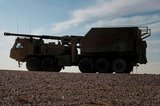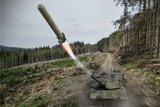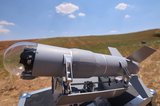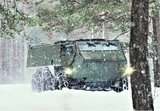Lockheed tests MHTK interceptor
Lockheed Martin's Miniature Hit-to-Kill (MHTK) interceptor has successfully completed a launch test during an engineering demonstration at the White Sands Missile Range, New Mexico, the company announced on 2 August.
The demonstration was part of the US Army's Aviation and Missile Research Development and Engineering Center (AMRDEC) Extended Area Protection and Survivability (EAPS) programme.
According to the company, the flight demonstrated the agility and aerodynamic capability of the MHTK missile, and increased its level of maturity.
The 72cm, 5lb MHTK is designed to defeat rocket, artillery and mortar targets at ranges exceeding those of current and interim systems. It uses hit-to-kill technology, which destroys threats through kinetic energy in body-to-body contact while removing the risk of collateral damage seen in traditional blast-fragmentation interceptors.
Janice Booth, program manager at AMRDEC, said: ‘We still need to review the data gathered, but we are pleased with what we have seen so far.
‘The MHTK has the potential to bring miniaturised capabilities to the warfighter with lower costs and reduced logistic footprints, and opens up a world of opportunities for applications of small interceptors.’
More from Land Warfare
-
![US Army seeks industry support to prepare acquisitions of Group 4+ UAVs]()
US Army seeks industry support to prepare acquisitions of Group 4+ UAVs
The US Army is keen to hear about vendor designs, strategies and potential hardware and software solutions to inform requirements for procurement efforts.
-
![Dedicated drone munitions could unlock modular mission potential]()
Dedicated drone munitions could unlock modular mission potential
Top attacks have proven effective against heavily armoured vehicles in Ukraine. A new family of uncrewed aerial system-delivered munitions is looking to press that advantage further.
-
![Germany signs multi-billion-dollar deals for 6x6 CAVS and GDELS Eagle vehicles]()
Germany signs multi-billion-dollar deals for 6x6 CAVS and GDELS Eagle vehicles
The order is a further boost for the Common Armoured Vehicles System programme which has notched notable successes in the past 12 months. The first vehicle, made in Finland, will be delivered next year with local production expected to ramp up in 2027.























